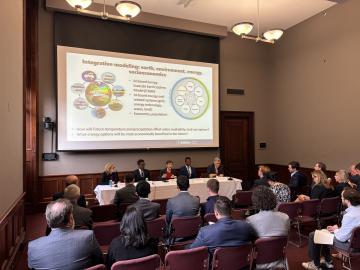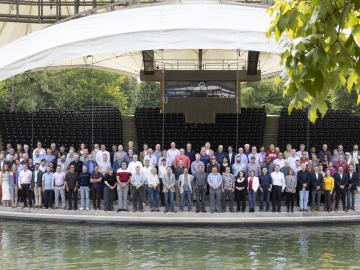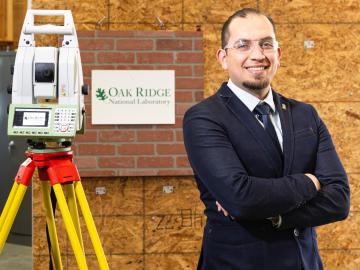
Filter News
Area of Research
News Type
News Topics
- (-) Artificial Intelligence (77)
- (-) Computer Science (111)
- (-) Critical Materials (5)
- (-) Microscopy (23)
- (-) Molten Salt (2)
- (-) Nanotechnology (17)
- (-) Polymers (9)
- (-) Security (16)
- 3-D Printing/Advanced Manufacturing (56)
- Advanced Reactors (12)
- Big Data (45)
- Bioenergy (68)
- Biology (80)
- Biomedical (42)
- Biotechnology (25)
- Buildings (30)
- Chemical Sciences (35)
- Clean Water (16)
- Composites (11)
- Coronavirus (19)
- Cybersecurity (14)
- Education (2)
- Emergency (3)
- Energy Storage (32)
- Environment (116)
- Exascale Computing (51)
- Fossil Energy (6)
- Frontier (44)
- Fusion (38)
- Grid (32)
- High-Performance Computing (81)
- Hydropower (6)
- Isotopes (33)
- ITER (4)
- Machine Learning (37)
- Materials (51)
- Materials Science (55)
- Mathematics (8)
- Mercury (7)
- Microelectronics (3)
- National Security (60)
- Neutron Science (82)
- Nuclear Energy (66)
- Partnerships (36)
- Physics (34)
- Quantum Computing (35)
- Quantum Science (48)
- Simulation (42)
- Software (1)
- Space Exploration (13)
- Statistics (2)
- Summit (40)
- Transportation (30)
Media Contacts

Aditya Sundararajan of ORNL’s Grid Systems Architecture group was elevated to senior status within the Institute of Electrical and Electronics Engineers.
Verónica Melesse Vergara and Felipe Polo-Garzon, two staff members at ORNL have been honored with Luminary Awards from Great Minds in STEM, a nonprofit organization dedicated to promoting STEM careers in underserved communities.

A team of researchers used the Frontier supercomputer and a new methodology for conducting a genome-wide association study to earn a finalist nomination for the Association for Computing Machinery’s 2024 Gordon Bell Prize for outstanding

Researchers led by the University of Melbourne, Australia, have been nominated for the Association for Computing Machinery’s 2024 Gordon Bell Prize in supercomputing for conducting a quantum molecular dynamics simulation 1,000 times greater in size and speed than any previous simulation of its kind.

To bridge the gap between experimental facilities and supercomputers, experts from SLAC National Accelerator Laboratory are teaming up with other DOE national laboratories to build a new data streaming pipeline. The pipeline will allow researchers to send their data to the nation’s leading computing centers for analysis in real time even as their experiments are taking place.

Prasanna Balprakash, director of AI programs for ORNL, discussed advancing climate and weather research through high performance computing and artificial intelligence as part of a September 18 panel for the United States Senate.

The Smoky Mountain Computational Sciences and Engineering Conference, or SMC24, entered its third decade with the 21st annual gathering in East Tennessee.

As high-tech companies ramp up construction of massive data centers to meet the business boom in artificial intelligence, one component is becoming an increasingly rare commodity: electricity. Since its formation in 2004, the OLCF has fielded five generations of world-class supercomputing systems that have produced a nearly 2,000 times reduction in energy usage per floating point operation per second, or flops. With decades of experience in making HPC more energy efficient, the OLCF may serve as a resource for best “bang for the buck” practices in a suddenly burgeoning industry.

Office of Science to announce a new research and development opportunity led by ORNL to advance technologies and drive new capabilities for future supercomputers. This industry research program worth $23 million, called New Frontiers, will initiate partnerships with multiple companies to accelerate the R&D of critical technologies with renewed emphasis on energy efficiency for the next generation of post-exascale computing in the 2029 and beyond time frame.

As a mechanical engineer in building envelope materials research at ORNL, Bryan Maldonado sees opportunities to apply his scientific expertise virtually everywhere he goes, from coast to coast. As an expert in understanding how complex systems operate, he’s using machine learning methods to control the process and ultimately optimize performance.


